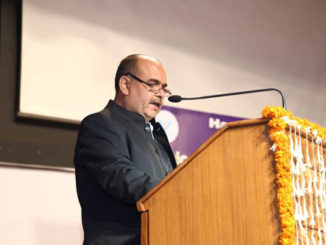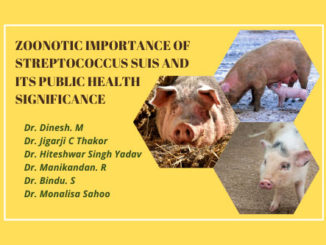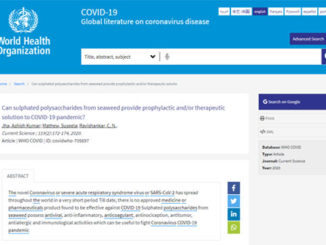Introduction
The Indian poultry sector is counteracted with a big crisis as fake news and fears related with novel coronavirus (Covid-19) hit consumption of chicken products, causing in a price crash. Numerous rumor’s that remain being circulated in social media about the probable spread of Covid-19 through chicken have shaped doubts in the minds of chicken eaters. This has caused in a sharp reduction in the consumption. India has over 10 lakh poultry producer close to 800 million birds annually. The market is predominantly driven by the production and sale of fresh poultry meat, and processed meat accounts for slightly above 5 %. The industry that has suffered most from the pandemic in India is the Poultry Industry which is mainly because of the rumors’ that circulated in social platform. The spread of Coronavirus through animals and chicken circulated among people and they started avoiding consumption of chicken, eggs, meat, fish etc. Covid-19 induced lockdown had hit the egg exports market due to transportation as well as distribution problems. Though there was freedom to essential commodities, closed markets and hesitancy of transporters hit the egg exports. While the losses cannot be retrieved, it is important that the poultry sector modernize itself and prepare to renew its supplies. Poultry farmers have suffer a major loss during the COVID-19 crisis and are now revival on this industry as poultry meat and eggs are a major source of nutrition which boosts up the immunity.
Importance of Poultry meat in human diet
The protein component in poultry meat is defined as ‘high quality’, healthy and well balanced. Poultry meat due to its nutritional richness with moderate energy content, highly digestible proteins, essential amino acids, unsaturated lipids, important vitamins (mainly thiamine, vitamin B6, and pantothenic acid), and minerals, (like iron, zinc, and copper) provide immunity to health. Poultry meat is an important source of the essential polyunsaturated fatty acids (PUFAs), especially the omega (n)-3 fatty acids enables these meats to be optimally incorporated into the diet at all ages. Many studies showed that adequate consumption of chicken meat can facilitate the control of body weight (especially due to its high protein content), positive effect on the risk of developing disease, diabetes, and cancer. Chicken is rich in niacin, which guards the body against cancer and other genetic complications. Selenium which is present in good quantities in chicken meat increases metabolism rates particularly the thyroid hormone, antioxidant defense system and immunity of the body. On the other hand, Chicken soup provide optimal nutrient like zinc and protein to support a normal immune system and also restore fluids loosen up mucous in the chest.
Importance of Poultry egg n human diet
Eggs are consumed by humans for thousands of years and are a good source of phosphorus, calcium, copper, magnesium, iodine, manganese, potassium, sodium, chloride, zinc, iron and Sulphur. These minerals are present in the form of organic chelates, which are highly bioavailable in egg. Nutrients present in eggs are essential parts of a healthy diet, and in several part of the world, eggs are a readily available source of food. Eggs can provide a numerous health benefits. Lutein present in eggs lowers the risk of cataracts and macular degeneration, predominantly among people existing in developing countries. The protein present in eggs maintains and repair body tissues, including muscle and the nervous system to function efficiently. Folic acid in eggs may help prevent congenital disabilities, promote good vision in human. Few vitamins and minerals also help to promote healthy skin and prevent breakdown of body tissues. Eggs are also rich in omega-3 fatty acids(docosahexaenoic acid, DHA) that helps to maintain brain function and vision.
Avoiding Risks from egg
Undercooked or raw eggs may be contaminated with microorganisms which can enter through pores in the shells. So eggs should undergo pasteurization, to kill off any form of microorganism specially Salmonella bacteria. Pasteurizing egg exposes the egg (in shell) to a temperature of 57 °C for an hour and 15 minutes. Cracked shells eggs should be avoided for consumption. People having allergy or sensitivity from egg should check ingredients in ready to eat products as, may experience a life threatening reaction if consumed eggs or egg products.
Veterinarian Role
Veterinarians have always played an integral role in public health and diseases prevention. Invaluable workforce of a veterinarian regarding services delivery to weathering the Covid-19 pandemic and preventing future pandemics. Covid-19 is an opportunity for the veterinarian to shine through its leadership quality and benefits to the society.
- Proper education to the consumers that the present kind of coronavirus is nowhere related to poultry since this is human specific it cannot live outside human body. Even there is no scientific research in India or globally that has linked Covid-19 with consumption of chicken.
- Solving and preventing this pandemic can be obtained through sound leadership and effective collaboration between sectors.
- Removal of infected birds from the uninfected flocks.
- Protecting from any emerging diseases through training, seminars and webinars by interaction with farmers.
- Priority research activities are allowed to continue throughout the pandemic.
- Preventive measures such as medication and vaccination against diseases with an economic impact.
- Marinating proper biosecurity levels at the farms and guiding the farmers to follow.
- Improvement are witness in market condition, which can be attributed to two factors increasing awareness by Veterinarian/Poultry expert that eggs are a rich source of nutrition that can increase immunity levels, which increases its demand, and second factor being feed price stabilisation of poultry.
- Extensive awareness campaigns by the Veterinarian, government and the recommendation of the Indian Council of Medical Research (ICMR) that egg is an immunity booster.
- Apart from awareness among people, reduction in the price of feed price also helped the farmers.
- One more important factor that helped the poultry Industry that government doubled the supply of eggs to the school children, though schools were closed eggs were sent to the homes of school children.
- Pregnant women, lactating women and children are supplied with eggs under the Sampoorna Poshana scheme.
- The awareness that poultry rearing can be a good startup among the unemployed youth and can be a good source of income equivalent or more that a govt. employee.
- Awareness among the small farmers the government organisation provides economic help to revive itself through relief packages and support to in restarting their businesses.
- Surveillance via diagnostic testing timely.
- Suguna foods With a strong R&D team has significantly increased production of vitamin-D enriched eggs across the country to help improve the immune system which remains critical in this crisis.
Future Challenges
The government must invest in cold storage for small and medium enterprises so that they can stock their culled birds as well as preserve their meat which can be sold later, thereby cutting down their losses. Several large cold storage units that are easily accessible to small scale poultry farmers and which are available on rental for a specific amount of space will be a welcome step for the poultry industry. Push for reforms to make the sector more organized The poultry Industry in India relies mostly on wet markets as Indians have a cultural preference for buying fresh produce which is why most customers select the bird before asking the butcher to slaughter it. Nonetheless, fresh does not always translate to clean and hygienic as some of these makeshift establishments are really unkempt and potential disease carriers. The future of the industry lies in moving to more hygiene, more processing and more cold chain dependent distribution. Though this will take time, consumer demand will drive the shift, opined. In India there are severe malnutrition issues in young children in rural areas. Interventional programmes of supplying eggs to these children though NGOs or entrepreneurs can help alleviate the problem and drive consumption. There already exists a market for enriched eggs and aware consumers are willing to pay a premium for such eggs. Recommendation by central and state governments to eat more chicken and eggs to boost immunity. Also, there is a spurt in online sales and some big farms have realized the importance of reaching consumers directly through home deliveries. Future challenges lies in creation of logistics supply chain and creation of cold chain.
Conclusion
Consumer confidence, product quality and safety, types of products, and the emergence and re-emergence of diseases will continue to be major challenges. Proper awareness about the Poultry that they are not susceptible to intranasal infection by the (COVID-19) virus. Governments, veterinarians, farmers, Poultry Companies, NGOs and all the partners of the chain of poultry production need to be more involved in the strategic future of the industry. In future, the consumers should be given enough guidance and knowledge through training, advertisement and awareness that such rumors’ or fake news does not affect the consumption rate of poultry products and affects the poultry Industry.






Be the first to comment